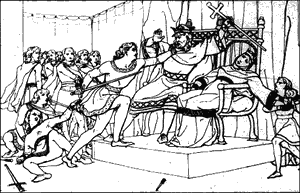
Manslaughter
 |
|
O villainy! Ho! Let the door be locked. |
Under Elizabethan law, an act of private revenge is considered manslaughter rather than first-degree murder if it is carried out immediately after another murder and in response to that murder. In such cases, the revenger may be subject to a royal pardon should such a pardon be granted.
>
Eleanor Prosser speculates that this would clearly have been the case had Hamlet's murder of Claudius been brought to the Elizabethan courts.
| As Shakespeare presents the final killing of Claudius, Hamlet is guilty of manslaughter, not premeditated murder. He would undoubtedly have received a royal pardon in the Elizabethan courts and even today would be treated with leniency. In a swift succession of terrible revelations, he realizes that his life is threatened, sees his mother die, hears that he himself is dying, and learns that the King is to blame for all. He administers the deathblow instinctively. He could do so under no more sympathetic circumstances. --Eleanor Prosser, Hamlet and Revenge, Stanford, CA,Stanford Univ Press, (1971) p.237. |